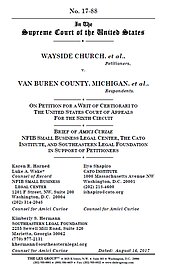Wayside Church v. Van Buren County, Michigan
Learn more about Cato’s Amicus Briefs Program.
In 2012, various properties in Van Buren County, Michigan became subject to foreclosure for property tax delinquencies. In 2014, the properties were subject to an order of foreclosure and were auctioned off to satisfy the delinquencies. Wayside Church owed $16,750 in back taxes on a parcel it used as a youth camp. When the property was sold for $206,000, Van Buren County kept the $189,250 in surplus as required by Michigan’s General Property Tax Act. Other taxpayers were similarly situated. For example, Myron Stahl and Henderson Hodgens had their properties auctioned for $68,750 to pay a $25,000 debt and $47,750 to pay a $5,900 debt, respectively. Michigan law doesn’t recognize a right to surplus proceeds from tax sales, so the property owners sued in federal court, alleging that the county violated the Fifth Amendment’s Takings Clause when it kept the surplus proceeds from the sale of their properties. The district court dismissed the suit, precisely because Michigan law doesn’t recognize a right to surplus proceeds in such cases. On appeal, a divided Sixth Circuit dismissed the case for lack of jurisdiction. Citing the Supreme Court’s ruling in Williamson County Regional Planning Commission v. Hamilton Bank of Johnson City (1985), the court held that plaintiffs’ failure to first pursue avenues of relief in state court barred the door to federal court. Wayside Church and the other property owners filed a petition asking the Supreme Court to take the case and clarify takings law. Along with the National Federation of Independent Business, Southeastern Legal Foundation, and Prof. Ilya Somin, Cato has filed an amicus brief supporting that petition. We argue that this case provides an excellent opportunity to preferably overrule, but at least reconsider, Williamson County’s requirement that a property owner must first sue in state court to ripen a federal takings claim. The reality is that Williamson County’s state-remedies requirement results in constitutional absurdity: the very state court decision that a property owner must receive in order to ripen their claim simultaneously bars the owner from (re)litigating the issue in federal court. The Williamson County rule has also proven to be a potent weapon in the hands of manipulative defendants. Since the Supreme Court ruled in 1997 that a takings claim filed in state court could be “removed” to federal court (because of the federal constitutional issue), governmental defendants have removed claims to federal court, and then argued that they should be dismissed as unripe! The state-remedies rule has no doctrinal basis and is antithetical to the Fourteenth Amendment, which was ratified to secure constitutional rights against the states and was seen as necessary to curb state government abuses. Fearing state courts could not be trusted to enforce the U.S. Constitution against their own state governments, a federal civil rights law 42 U.S.C. § 1983 was then enacted to ensure a federal forum for vindicating federal rights. YetWilliamson County has effectively gutted the protections of both of these Reconstruction-era reforms. Before Williamson County, there was no rule that required a property owner to resort to litigation in order to ripen a takings claim, and nothing in the text of the Fifth Amendment suggests that litigation in state court is necessary to ripen a takings claim. Instead, the text should be read to recognize a ripened claim the moment property is taken if there isn’t a readily available administrative procedure for obtaining just compensation.
